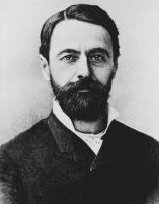Joseph Le Bel
Joseph-Achille Le Bel (born January 21, 1847 in Pechelbronn , Alsace , † August 6, 1930 in Paris ) was a French chemist .
Live and act
Pechelbronn was the first place in Europe where oil was extracted. Le Bel came from a wealthy Alsatian family who controlled the oil industry in Pechelbronn. His father was Frédéric-Louis Achille Le Bel (1807-1867).
In 1865 he was sent to the École polytechnique in Paris for a chemical education and spent much of his time in basic chemical research. After completing his studies, he worked as an assistant to the chemists Antoine Balard and Adolphe Wurtz in Paris at the Sorbonne , where, among other things, he dealt with the composition of the oil in his homeland. As early as 1874 he published a decisive work on the relationship between " atomic formulas " and the rotational power of organic compounds.
In 1882 he took over the management of the company in Pechelbronn, which he had inherited from his father. He developed a distillation process to process the crude oil. The company experienced a great economic boom under his leadership. In 1889, however, he sold the company because the role of industrial manager was unsatisfactory and returned to Paris as a multi-millionaire.
From 1889 he worked first in Armand Gautier's laboratory at the Ecole de Médecine and later as a private scholar without ties to a university or institute. For this purpose, he set up his own laboratory in his house, and he also had a shaft 45 m deep built in order to have a place with an almost constant temperature. This was also used for his investigations into so-called catathermic radiation, a type of radiation that, according to his hypothesis, should compensate for terrestrial heat losses.
Le Bel derived the tetrahedral structure of many organic carbon compounds from theoretical considerations . With this he founded modern stereochemistry . The term stereochemistry was only introduced a few years later, in 1888, based on a suggestion by Victor Meyer (1848–1897).
He interpreted the then puzzling optical activity of organic compounds through the assumption of tetrahedral, asymmetric carbon atoms. He found this explanation in 1874 at the same time, but independently of Jacobus Henricus van 't Hoff . In later years Le Bel studied cosmic rays .
He was also interested in geology and became a member of the Société Préhistorique Française (SPF) in November 1911 . From 1914 to 1923 he was its active chairman; Honorary Chairman from then until his death. Le Bel acquired the Grotte des Eyzies in Dordogne , about 125 km east of Bordeaux, and discovered the Grotte du Grand Roc . He was buried in the Bagneux cemetery.
Works
- Cosmology Rational (1929)
literature
- Jost Weyer : The portrait: Joseph Achille Le Bel 1847-1930 . In: Chemistry in Our Time . tape 8 , no. 5 , 1974, p. 143-147 , doi : 10.1002 / ciuz.19740080504 .
- George Mann Richardson, Louis Pasteur , Jacobus van 't Hoff, Joseph Achille Le Bel, Johannes Wislicenus : The Foundations of Stereo Chemistry. Memoirs by Pasteur, van't Hoff, Lebel and Wislicenus , American Book Co., New York 1901.
- J. Maury, Joseph Achille Le Bel, Arthur Edmunds: Laugerie Basse: The Excavations of MJ-A. Le Bel. Le Mans, Monnoyer, 1925.
- Vie et œuvres de Joseph-Achille Le Bel, published by P. Dupont, 1949.
Web links
- Portrait from later years
- Biography in English of Joachim Schummer
- Entry on Bel, Joseph Achille Le (1847–1930) in the Archives of the Royal Society , London
Individual evidence
- ↑ antarama.free.fr: Pechelbronn ( Memento from April 7, 2013 in the web archive archive.today )
- ↑ Biography of musee du petrole ( Memento from 1 June 2011 at the Internet Archive ). P. 5–7 (French, PDF file; 127 kB).
- ↑ a b Entry on Joseph-Achille Le Bel . In: Lexikon der Biologie , Spektrum-Verlag, accessed on July 13, 2008.
- ↑ J. Daintith, S. Mitchell, E. Tootill, D. Gjertsen: Biographical encyclopedia of scientists. 1994, CRC Press, ISBN 0-7503-0287-9
- ↑ Bulletin de la SPF No. 9 (1930), p. 401: Obituary (French)
- ↑ biography (French)
| personal data | |
|---|---|
| SURNAME | Le Bel, Joseph |
| ALTERNATIVE NAMES | Le Bel, Joseph-Achille (full name) |
| BRIEF DESCRIPTION | French chemist |
| DATE OF BIRTH | January 21, 1847 |
| PLACE OF BIRTH | Pechelbronn , Alsace |
| DATE OF DEATH | August 6, 1930 |
| Place of death | Paris |
